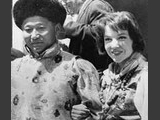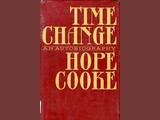Amateurfunk aus Sikkim
Hope Cooke, die letzte Königin von Sikkim
Auszüge aus ihren Memoiren

![]() Going to Gangtok (p 81)
Going to Gangtok (p 81)
So many things seem preordained. I feel attracted to, at home with this man in particular. Although I feel he has his own weight heavy enough to be a counterpoise to anchor me - more important, we have a connection so close it's almost like a membrane joining us. Sometimes it seems that, in an almost Buddhist way, I've lost my ego and am becoming an undifferentiated part of Maharaj Kumar. Paradoxically, however, just by loving him and he loving me, I've begun to stir up controversy, welcome people's perception of me here as different, as "other"; it freezes, shrinks, educes me into a solid, tangible object.
The marriage (p 105)
The service is simple - an exchange of scarves symbolizing a social contract between the two families, and a prayer for auspiciousness. ... I glide along the polished floor of the Tsuk Lhakhang, or royal chapel, to light the butter lamps in front of the image of Buddha and Guru Padmasambhava, the teacher who brought Buddhism to Tibet and Sikkim in the eigths cenrtury. ... As each wick catches, it seems a spark of my will, my determination, to make this marriage happy. ... Going to sit down on the gilded, carved throne next to my husband ... my active participation is over.
Growing tension (p 227)
I first hear the demonstrators coming up the road - a vast sigh, long cooing noises. When they fan out along the lower circular road around the palace compound, you can make out the chanted words. "Chogyal murabad, Kazi ko jai, Indira Gandhi ko jai, Bhutia Lepcha katum. Bharat ko jai." ("Death to the Chogyal, long live Kazi, long live Indira Gandhi, an end to Bhutia Lepchas. Long live India.") ... The leaders shout orders. It's most frightening when they come along a path adjoining the lawn that is separated from the western side of the palace only by a fringe of bamboos. They come several times a day, each time circling the house for several hours.
The end (p 233, 242, 248, 256)
Much later that evening, in the living room, a paper is signed by all the men, asking for Indian intervention. >I think Chogyal wanted it, although earlier he had angrily rejected a threatening note from the Indian Representative offering personal safety for our family in return for handing over power. ... A call came to the Chogyal from The New York Times. When he is asked if the Indian government had anything to do with the take-over, he replies with almost imperceptible irony: "How could they? They are our protecting power." ... After the Indians have clear control the siege lifts. It is the third week of May. We have been indoors since the fourth of April. (It is decided that Hope and her children leave the country.) The date has been set. We're to leave the afternoon of August 15. ... I go up on the verandah to take scarves from the servants. I embrace Chogyal a final time and the children touch their forheads to his. We wheel in the car up to the chapel, where we put rice in the silk scarves, tie a knot, and then throw them up to the images on the hight altar. ... Returning from the chapel, we drive ... down the driveway. Not looking back. Through the geranium-ringed red-and-yellow gate.
Epilogue (p277, 281)
On April 9, the Indian Army, under Government of India orders, attacked the palace and at gunpoint put the Chogyal and Tenzing, his son, under house arrest. Within the week Sikkim, by a referendum held under Government of India aegis, had become India's twenty-second state. My children and I were now virtually stateless; the Chogyal and Tenzing were prisoners - protective custody, the Indians called it. ... At twelve-thirty, while the Sikkim Guards were having lunch, the Indian Army atacked. The Guard's barracks were overrun. At the main gate of the palace the sentry was shot dead at point-blank range. ... Despite the guns pointing at him, Chogyal had walked down to the palace gate to pay tribute to the dead guard. (When) Chogyal signed a paper recognizing the application of India's constitution to Sikkim (in late spring of 1978), he was given permission for the first time to travel abroad. When he came, (I took the children) down to New York to greet their father. There, Thondup (I'd never called him that before; it would have been better if I had) and I arranged to make our separation official in the fall.




